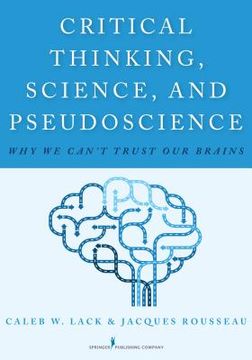Compartir
Critical Thinking, Science, And Pseudoscience: Why We Can t Trust Our Brains (en Inglés)
Caleb W. Lack
(Autor)
·
Jacques Rousseau
(Autor)
·
Springer Publishing Company
· Tapa Blanda
Critical Thinking, Science, And Pseudoscience: Why We Can t Trust Our Brains (en Inglés) - Lack, Caleb W. ; Rousseau, Jacques
$ 376.104
$ 578.622
Ahorras: $ 202.518
Elige la lista en la que quieres agregar tu producto o crea una nueva lista
✓ Producto agregado correctamente a la lista de deseos.
Ir a Mis Listas
Origen: España
(Costos de importación incluídos en el precio)
Se enviará desde nuestra bodega entre el
Lunes 03 de Junio y el
Viernes 14 de Junio.
Lo recibirás en cualquier lugar de Colombia entre 1 y 5 días hábiles luego del envío.
Reseña del libro "Critical Thinking, Science, And Pseudoscience: Why We Can t Trust Our Brains (en Inglés)"
This unique text for undergraduate courses teaches students to apply critical thinking skills across all academic disciplines by examining popularpseudoscientific claims through a multidisciplinary lens. Rather than merely focusing on critical thinking, the text incorporates the perspectives ofpsychology, biology, physics, medicine, and other disciplines to reinforce different categories of rational explanation. Accessible and engaging, itdescribes what critical thinking is, why it is important, and how to learn and apply skills that promote it. The text also examines why critical thinkingcan be difficult to engage in and explores the psychological and social reasons why people are drawn to and find credence in extraordinary claims. From alien abductions and psychic phenomena to strange creatures and unsupported alternative medical treatments, the text uses examples from a wide rangeof pseudoscientific fields and brings evidence from diverse disciplines to critically examine erroneous claims. Particularly timely is the text'Äôsexamination of how, using the narrative of today'Äôs 'Äúculture wars, 'Äù religion and culture impact science. The authors focus on how the human brain, rife withnatural biases, does not process information in a rational fashion, and the social factors that prevent individuals from gaining an unbiased, criticalperspective on information. Authored by a psychologist and a philosopher who have extensive experience teaching and writing on critical thinking andskeptical inquiry, this work will help students to strengthen their skills in reasoning and debate, become intelligent consumers of research, and makewell-informed choices as citizens. KEY FEATURES: Addresses the foundations of critical thinking and how to apply it through the popular activity of examining pseudoscience Explains why humans are vulnerable to pseudoscientific claims and how critical thinking can overcome fallacies and biases Reinforces critical thinking through multidisciplinary analyses of pseudoscience Enlightens using an engaging, entertaining approach Features teaching resources including an Instructor'Äôs Guide and PowerPoint slides

